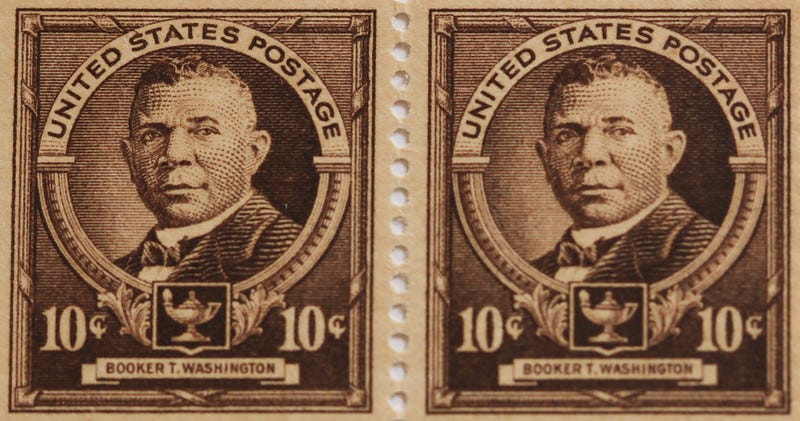Between Juneteenth and Independence Day
Slavery’s wounds are deep, but there are two ways to mourn its stain
Union soldiers entered Galveston on June 19, 158 years ago, officially ending slavery in Texas. Today, we know the day as Juneteenth.
It’s fitting that Juneteenth and the Fourth of July are separated by just a few weeks. The Fourth of July made the promise that all men are created equal, and the emancipation of slaves took a major step to apply that promise to all men. Still today, slavery’s wounds are deep—but there are two ways to mourn its stain.
The first claims that because slavery betrayed America’s founding ideals, those ideals were hogwash. It hold that the words “all men are created equal” were written by white supremacist hypocrites, the Constitution and the Declaration of Independence were handed down by irredeemable men, and the legacy of slavery will never leave us. Down this path lies never-ending condemnation and self-destructive bitterness.
The Booker T. Washington National Monument in Burnt Chimney, Virginia. Donnie Nunley/Flickr.
The second path instead mourns with hope and forgiveness. This way recognizes the evils done to slaves as well as the Founders’ flaws, but leaves room to admire men like George Washington and Thomas Jefferson for fighting for the very ideas that would lead to slavery’s abolition. This way acknowledges the great strides America has made, honors the hundreds of thousands of brave men who spilled blood to end slavery, and recognizes that the path forward is to acknowledge the sins of the past while also forgiving those sins and rejecting hatred.
Booker T. Washington is a model for this second path. Washington was born a slave and was freed at the age of nine. He spent his next years working in salt mines, a coal mine, and attending Hampton Normal and Agricultural Institute in Virginia, where he also worked as a janitor. Washington eventually graduated with honors, and even spoke at his commencement.
After graduating, he became the first teacher at what is now known as Tuskegee University—a private black school founded by the Alabama legislature on Independence Day, 1881. Under Washington’s guidance, Tuskegee became a “powerhouse of African-American education and political influence in the United States,” growing from a modest institution housed in a shanty into a large campus where hundreds of African-American students studied annually, learning “carpentry, cabinet-making, printing, shoemaking… tinsmithing,” and other trades.
Washington believed in self-empowerment, and in finding purpose through hard work. He would have shunned the grievance-mongering that dominates today.
The Booker T. Washington 10-cent stamp. John Flannery/Flickr.
“I would permit no man, no matter what his colour might be, to narrow and degrade my soul by making me hate him,” he wrote in his autobiography, Up From Slavery. “With God’s help, I believe that I have completely rid myself of any ill feeling toward the Southern white man for any wrong that he may have inflicted upon my race.”
Republican Sen. Tim Scott also embraces the second path, with a clear-eyed and optimistic view of how far race relations have come. “It’s backwards to fight discrimination with different discrimination,” the presidential candidate declared in a 2021 speech. “And it’s wrong to try to use our painful past to dishonestly shut down debates in the present.”
Former President Barack Obama attacked him for this opinion, but pardoning monstrous wrongs requires sacrifice and courage. We can’t legislate these virtues, but we can learn them from studying history and finding inspiration from great souls.
This Juneteenth, reject grudges and choose instead the path of reconciliation and learning. We should reflect on the ideals of July 4 and how our country, though imperfect, has worked steadily to implement them. We must shun the gospel of grievance that is tearing America apart, that preaches an original sin without a savior, a hell without a heaven, and a never-ending repentance that doesn’t lead to salvation. Instead, we should recognize America’s faults while celebrating our triumphs over them, putting old grievances to rest.






